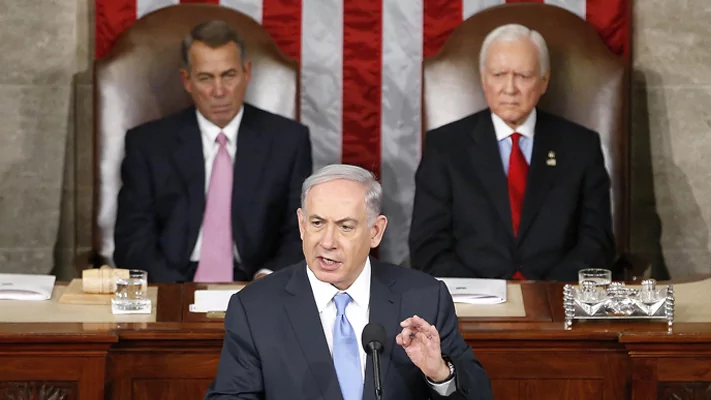
Normally, a visit to Congress from the leader of a key U.S. ally in wartime wouldn’t be controversial. But Israeli Prime Minister Benjamin Netanyahu isn’t a normal world leader. And his scheduled July 24 speech to a joint session of Congress has the potential to be uniquely divisive.
It comes amid increased global pressure on Israel, seeking to finish its military campaign against Hamas, the terrorist group that murdered about 1,200 Israelis on Oct. 7, 2023, while also committing rape and kidnapping, with an estimated more than 130 people still being held hostage eight months later.

It’s not just about U.S. support for Israel as its war against Hamas stretches on. That has become a flashpoint within the Democratic Party as many on the Left grow increasingly concerned about the scale of humanitarian problems in the Gaza Strip as a result of the conflict.
Instead, it’s about Netanyahu himself. The result is a growing list of Democrats who have said they will not attend the Israeli prime minister’s scheduled speech in July and increased grumbling about the decision of Senate Majority Leader Chuck Schumer (D-NY) to sign on to the invitation from House Speaker Mike Johnson (R-LA) for Netanyahu to come to Washington.
While there has long been a dedicated rump of anti-Israel Democrats in the House, the bigger concern is that Netanyahu is considered a partisan actor in American politics who has sought to undermine Democrats for over a decade, going back to the 2012 presidential election, in which he all but endorsed Republican presidential nominee Mitt Romney. This continued with his 2015 speech before Congress in which he lobbied against the Iran nuclear deal and criticized the foreign policy of then-President Barack Obama from the dais of the House of Representatives. The speech not only alienated Democrats but failed to stop the implementation of the nuclear deal with the Iranian regime.
This ornery relationship hasn’t improved during the war. On June 18, Netanyahu released a brief English-language video online in which he claimed the United States had been withholding weapons and ammunition from Israel. The result was befuddlement and outrage from President Joe Biden’s administration.
Even his invitation from Schumer, who delivered a scathing attack on Netanyahu on the Senate floor in March, calling for new elections in Israel and labeling the Israeli prime minister an obstacle to peace in the region, has come under heavy criticism. However, Johnson did not need Schumer’s permission to invite Netanyahu to address the House. The 2015 speech, during Obama’s administration, solely required the invitation of then-House Speaker John Boehner, an Ohio Republican. Instead, Schumer’s decision to join with Johnson in bringing Netanyahu to Capitol Hill has been framed as an effort to try to depoliticize the remarks. The New York Democrat told reporters earlier in June, “I have clear and profound disagreements with the prime minister, which I have voiced both privately and publicly and will continue to do so. But because America’s relationship with Israel is ironclad and transcends one person or prime minister, I joined the request for him to speak.”
The question puzzling Democrats is whether all of Schumer’s efforts to lower the temperature will be for naught and that, instead, Netanyahu will use his speech to create further division within the party and attempt to further make U.S. support for Israel a partisan matter that divides Democrats and Republicans.
One senior Democratic aide on Capitol Hill thought the speech was a terrible idea and had major concerns about how this would make the already tenuous relationship between Netanyahu and Biden even more toxic and further undermine support for Israel among congressional Democrats.
The dread of Netanyahu’s visit has long been clear. Sen. Chris Coons (D-DE), a close Biden ally, said on Face The Nation earlier in June, “Prime Minister Netanyahu has a long record of being very partisan and very divisive.” Coons added, “Prime Minister Netanyahu isn’t just divisive here, he’s divisive at home,” as he noted the long-lasting protests against the Israeli leader initially stemming from his failed effort at judicial reform, which has bled into continuing dismay with his conduct of the war and failure to bring home the remaining hostages held by Hamas.
Other Democrats agreed. Rep. Steve Cohen (D-TN) told the Washington Examiner, “I don’t think it is good for the Israelis to try to divide Democrats and Republicans.” However, he noted that he thought Netanyahu’s motivations seemed invariably to be focused on “short-term” gain and immediate political benefit.
However, some held out hope that the event could somehow be unifying. Rep. Josh Gottheimer (D-NJ), an ardently pro-Israel centrist, told the Washington Examiner, “I don’t think it should create a wedge [among Democrats]. I think this is about how the United States and Israel are key critical allies in the fight against terror.”
Netanyahu, though, is not the only actor here.
As Rep. Greg Landsman (D-OH) pointed out, “It’s members that get to decide whether or not they make it partisan. I’m not.”
The first-term House member added, “I would encourage all my colleagues to ensure that it isn’t partisan and it doesn’t become a divisive thing. We engage in a way that advances the things that we clearly all have in common, which is we want Israel to survive — most of us do — and we want an end to this war. We want the hostages returned, and we want a post-conflict reality where there is peace and stability and an infinitely better future for the Palestinians.”
But, for many Democrats, the well has already been poisoned and the legacy of Netanyahu’s past interventions in American politics is too much. Rep. Ro Khanna (D-CA) said on Meet The Press, “I will not attend. I said that if he wants to come to speak to members of Congress about how to end the war and release hostages, I would be fine doing that. But I’m not going to sit in a one-way lecture. … I mean, how he treated President Obama, he should not expect reciprocity.”
Others are still weighing their options. Rep. Jamie Raskin (D-MD) was cagey when asked recently by the Washington Examiner about his plans to attend. “A month is like lightyears from here,” he said. “I’m very hopeful that we are going to get a ceasefire and get this beyond this nightmare, but I have literally not had a minute to turn through a stack of mail about whether members should go or not.”
However, with a month still to go before the speech, events could always dramatically change the circumstances in which Netanyahu speaks in Washington. There could be a ceasefire as part of a deal to free the Israeli hostages held by Hamas in Gaza. Or there could be an escalation along Israel’s border with Lebanon, which has faced constant bombardment by Hezbollah.
But the key variable is always whether Netanyahu makes the calculation that further polarizing the U.S.’s relationship with Israel is worth any possible short-term gain in his country’s perpetually turbulent domestic politics.
CLICK HERE TO READ MORE FROM THE WASHINGTON EXAMINER
After all, when Rep. Tom Suozzi (D-NY) was asked by the Washington Examiner whether Netanyahu’s speech would be helpful for the American alliance with Israel, the answer was succinct.
“Depends on what he says.”
Ben Jacobs is a writer based in Washington, D.C.







